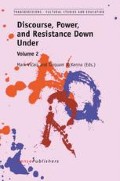Abstract
The idea for this chapter came about in reading Richardson and St. Pierre’s (2005) ‘Writing as a method of inquiry’, which instigated a re-understanding of a key piece of writing in my research, which could be considered an accidental method of inquiry.
Access this chapter
Tax calculation will be finalised at checkout
Purchases are for personal use only
Preview
Unable to display preview. Download preview PDF.
References
Alldred, P., & Burman, E. (2005). Analysing Children’s accounts using discourse analysis. In S. Greene & D. Hogan (Eds.), Researching children’s experience: methods and approaches (pp. 175–198). London: Sage.publications.
Butler, J. (1990). Gender Trouble: Tenth Anniversary Edition. New York: Taylor & Francis Group.
Code, L. (2006). Women knowing/Knowing women: Critical-creative interventions in the politics of knowledge. In K. Davis, M. Evans & J. Lorber (Eds.), Handbook of gender and women’s studies (pp. 146–166). London Sage Publications.
Davies, B. (1998). Psychology’s subject: A commentary on the relativism/Realism debate. In I. Parker (Ed.), Social constructionism, discourse, and realism (pp. 133–135). London: Sage publications.
Davies, B., & Gannon, S. (2005). Feminism/ Poststructuralism. In B. Somekh & C. Lewin (Eds.), Research methods in the social sciences (pp. 318–325). London: Sage publications.
Davies, B., & Gannon, S. (2006). Doing collective biography: Investigating the production of subjectivity. Berkshire: McGraw-Hill.
Fine, M. (1992). Passion, politics and power: Feminist research possibilities In M. Fine (Ed.), Disruptive voices: The possiblities of feminist research (pp. 205–232). Michigan: University of Michigan Press.
Finlay, L. (2002). “Outing” the researcher: The provenance, process, and practice of reflexivity. Qualitative Health Research, 12(4), 531–545. doi: 10.1177/104973202129120052
Foucault, M. (1977). Discipline and punish : The birth of the prison. New York: Pantheon Books.
Foucault, M. (1980). The Eye of Power (C. Gordon, Trans.). In C. Gordon (Ed.), Power/Knowledge: selected interviews and other writings 1972–1977. New York: Pantheon Books.
Fryer, D., & Laing, A. (2008). Community psychologies: What are they? What could they be? Why does it matter? A critical community psychology approach. The Australian Community Psychologist, 20(2), 7–15.
Gavey, N. (1989). Feminist poststructuralism and discourse analysis: Contributions to feminist psychology. Psychology of Women Quarterly, 13(4), 459–475. doi: 10.1111/j.1471-6402.1989.tb01014.x
Haug, F., Andresen, S., Bünz-Elfferding, A., Hauser, K., Lang, U., Laudan, M.,... Thomas, C. (1987). Female sexualization: A collective work of memory (E. Carter, Trans.). London: Verso.
Parker, I. (1992). Discourse dynamics: Critical analysis for social and individual psychology. London: Routledge & Kegan Paul.
Parker, I. (2005). Qualitative psychology: Introducing radical research. Berkshire: McGraw-Hill.
Pillow, W. (2003). Confession, catharsis, or cure? Rethinking the uses of reflexivity as methodological power in qualitative research. International Journal of Qualitative Studies in Education, 16(2), 175–196. doi: 10.1080/0951839032000060635
Ramazanoğlu, C. (Ed.). (1993). Up against foucault: Explorations of some tensions between foucault and feminism. London: Taylor & Francis Group.
Richardson, L., & St. Pierre, E. (2005). Writing: A method of inquiry. In N. K. Denzin & Y. S. Lincoln (Eds.), The SAGE Handbook of Qualitative Research (pp. 959-978). London: SAGE Publications.
Spivak, G. C. (1988). Can The Subaltern Speak?. In L. Grossberg (Ed.) Marxism and the interpretation of culture. Urbana: University Of Illinois Press.
St. Pierre, E., & Pillow, W. (2000). Working ruins: Feminist poststructural theory and methods in education. New York: Psychology Press.
Stephenson, N., & Papadopoulos, D. (2006). Analysing everyday experience: Social research and political change. New York: Palgrave Macmillan.
Ussher, J. (2003). The role of premenstrual dysphoric disorder in the subjectification of women. Journal of Medical Humanities, 24(1–2), 131–146. doi: 10.1023/a:1021366001305
Author information
Authors and Affiliations
Editor information
Editors and Affiliations
Rights and permissions
Copyright information
© 2013 Sense Publishers
About this chapter
Cite this chapter
Easpaig, B. (2013). The Problem of Writing As A Solution. In: Vicars, M., McKenna, T. (eds) Discourse, Power, and Resistance Down Under. Transgressions. SensePublishers, Rotterdam. https://doi.org/10.1007/978-94-6209-509-0_8
Download citation
DOI: https://doi.org/10.1007/978-94-6209-509-0_8
Publisher Name: SensePublishers, Rotterdam
Online ISBN: 978-94-6209-509-0
eBook Packages: Humanities, Social Sciences and LawEducation (R0)

